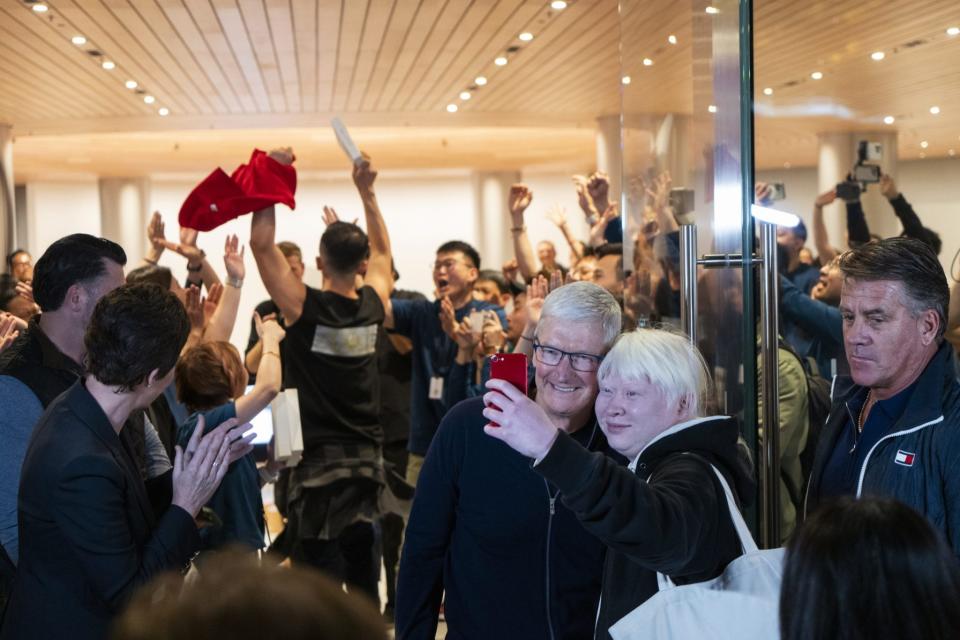Tim Cook’s job just got a lot more complicated with an antitrust suit piled on top of his China and Europe problems

Tim Cook is facing fires everywhere.
The U.S. Justice Department and over a dozen states just hit Apple with a long-anticipated blockbuster antitrust suit, covering a vast array of alleged violations that were all aimed at protecting Apple's control of the iPhone ecosystem—placing restrictions on third-party digital wallets and app stores, stymying cross-platform messaging, suppressing cloud gaming services, and more.
“Consumers should not have to pay higher prices because companies violate the antitrust laws,” Attorney General Merrick Garland said in a statement. “We allege that Apple has maintained monopoly power in the smartphone market, not simply by staying ahead of the competition on the merits, but by violating federal antitrust law."
This is the U.S. government attempting to do what the EU is trying to achieve with its crackdown on Apple (and other Big Tech firms) via the new Digital Markets Act. Many elements are shared—but these American claims go even further, by adding things like Apple's refusal to let third-party smartwatches work fully with the iPhone.
At the time of writing, Apple's share price had fallen by 2.6%. Make no mistake: If the DOJ and states get their way, Apple's whole way of doing business is under threat, and not just in Europe this time.
The suit comes just after Cook launched a charm offensive in China, on his latest visit there. “There’s no supply chain in the world that’s more critical to us than China,” he said yesterday in a China Daily interview. Today he opened Shanghai’s eighth Apple store, chatting with suppliers and taking selfies with customers.
He knows he has his work cut out for him there. Apple's iPhone sales are sliding in the face of strong competition from local champion Huawei, and a drive from Beijing itself to have state employees ditch their iPhones in favor of Chinese devices. The flood of ever-cheaper Chinese electric vehicles was probably a major factor in Apple’s decision to abandon its own auto plans. And tech relations between the U.S. and China keep getting testier and testier.
While Cook made his visit, Bloomberg reported yesterday that the Biden administration was considering an escalation of its campaign against the Chinese semiconductor industry by applying sanctions against seven chipmakers and chipmaking-equipment firm in the country, all of which work with Huawei in some capacity. The apparent logic is that existing sanctions haven’t stopped Huawei from making great technological strides, including the introduction of the 7-nanometer chip that powers the Huawei Mate 60 smartphone—the same device that’s been taking a chunk out of iPhone 15 sales in China.
Meanwhile, the U.S. House of Representatives yesterday built on last week’s anti-TikTok bill by passing a new data-privacy bill called the “Protecting Americans’ Data from Foreign Adversaries Act.” If it then makes its way through the Senate and gets President Joe Biden’s signature, this law would make it illegal for data brokers to pass on Americans’ sensitive data to any foreign adversary country, which means China, Russia, North Korea, Iran, Cuba, and the Venezuelan regime.
And it looks like this measure has a better shot than last week’s bill, which would force China’s ByteDance to sell TikTok to a non-Chinese concern or see it banned in the U.S. It passed the House 414-0, whereas the TikTok bill passed by 352-65. As Politico notes, even opponents of the TikTok bill like this one because, rather than targeting a particular company, it would limit what an entire sector can do with Americans’ data, making it the first potential federal data-privacy law in a long time. “This is what we should have voted on last week,” Gen Z Rep. Maxwell Frost (D-Fla.) told the publication.
All the Cookian charm in the world can’t make up for this growing U.S. hostility to China’s tech interests, and the responses it will trigger if this continues. And as for the rapidly metastasizing threats to Apple's controlling nature…well, I wouldn't want to be in Cook's shoes right now.
More news below.
David Meyer
Want to send thoughts or suggestions to Data Sheet? Drop a line here.
This story was originally featured on Fortune.com

 Yahoo Finance
Yahoo Finance 